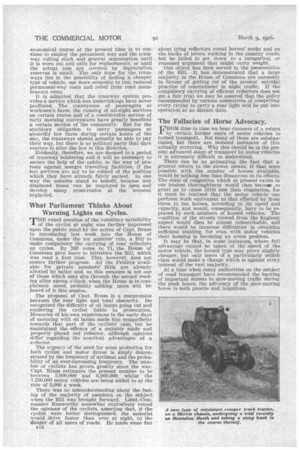The Fallacies of Horse Advocacy.
Page 2

If you've noticed an error in this article please click here to report it so we can fix it.
FROM time to time we hear rumours of a return by certain former users of motor vehicles to horsed transport. Not many .of these are substantiated, but there are isolated instances of this actually occurring. Why this should be in. the present advanced stage of transport by motor vehicles it is extremely difficult to understand.
There can be no gainsaying the fact that a general return to the slower means, If that were possible with the number of horses available, would be nothing less than disastrous in its effects. The state of congestion which at present exists in our busiest thoroughfares would then beconfie .so great as to cause little less than stagnation, for it must be realized that the motor vehicle can perform work equivalent to that effected by from three to ten horses, according to its speed and capacity, and would, -consequently, have to be replaced by such numbers of horsed vehicles. The condition of the streets viewed from the hygienic aspect would then be almost indescribable, and there would be immense difficulties in obtaining sufficient stabling, for, even with motor vehicles their housing is becoming an acute problem.
It may he that, in some instances, where full advantage cannot .be taken of the .speed of tho motor vehicle, the horsed type may prove slightly cheaper, but only users of a particularly selfish classwould make a change Which is against every interest of the vast majority.
At a time when many authorities on the subject of road transport have recommended the barring of important streets to slow-moving traffic during the peak hours, the advocacy of the .slow-moving horse is both puerile and iniquitous.




























